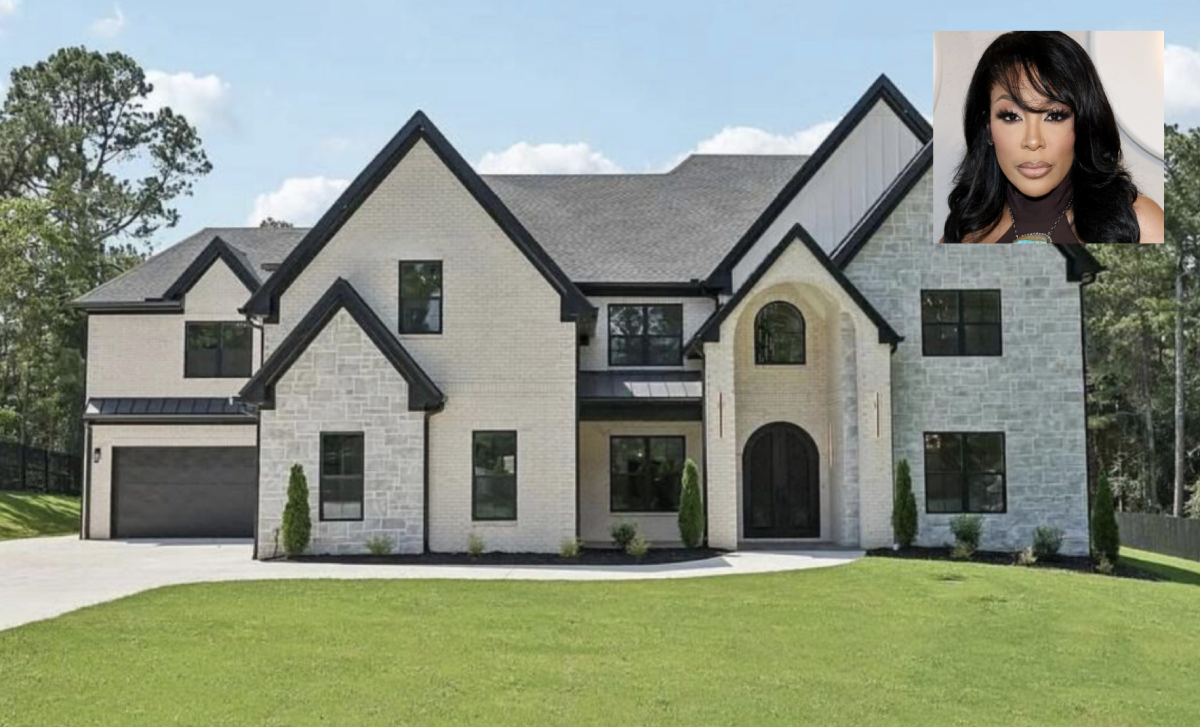-
One thing to clarify if you’re serious about buying a home in Atlanta in this real estate market is: How much house can I afford?
The question is one that needs to be weighed seriously because all you have to do is visit the steps of the Fulton, DeKalb or Cobb County courthouse to see foreclosure auctions in action.
Here’s How Much House You Can Afford In Atlanta (Calculator)
People buy more house than they need for several reasons:
- Bad advice from Realtors
- Keeping up with the Joneses
- Resale purposes
Let’s talk about each of these a little bit before we move into what homes cost in Atlanta:
Whether you’re a first-time buyer eyeing a cozy condo in Midtown, a growing family looking at suburbs like Alpharetta or Decatur, or an investor scouting opportunities, knowing your budget is the first step.
Current Atlanta Housing Market Snapshot (Early 2026)
- Median home price: Around $420,000–$440,000 (varying by source; metro area sales prices have stabilized after 2025 adjustments, with modest growth expected nationally).
- Average 30-year mortgage rates: Hovering in the low-6% range (forecasts suggest 6.1%–6.3% averages for 2026).
- Market outlook: A more balanced environment with increased inventory, giving buyers better negotiating power compared to the peak frenzy years. Prices are projected to rise modestly (2–4% nationally), but Atlanta’s market is cooling slightly for sustainability.
Buying a home in Atlanta remains achievable for many, especially with rates easing from recent highs. Factors like your income, credit score, down payment, and debts play a huge role.
Quick Affordability Guidelines for 2026
Using standard lending rules (28%–36% debt-to-income ratio):
- On a $80,000 household income, you could afford a home in the $300,000–$350,000 range (with 10–20% down).
- On a $100,000 income, aim for $400,000–$450,000.
- On a $150,000 income, $550,000–$650,000 is realistic.
These are estimates assuming good credit, a 10% down payment, and including property taxes (1.0–1.2% of home value in metro Atlanta), homeowners insurance ($2,000–$3,000/year), and PMI if down payment <20%.Use Our Atlanta Home Affordability CalculatorPlug in your details for a personalized estimate:
- Annual household income: $
- Monthly debts (car loans, student loans, credit cards): $
- Down payment saved: $
- Preferred mortgage rate (current avg ~6.2%): %
- Credit score range: Excellent (740+) / Good (700–739) / Fair (640–699)
Bad advice from Realtors
Real estate agents play a vital role in the homebuying process, but you have to know when they’re in and out of their lane.
A Realtor has no business telling you how much house you can afford. That’s what a lender is for. A Realtor should only advise you on what type of home you want.
Still, many people listen to Realtors who are out to make a buck. Some of them will tell you that you can afford the home by this strategy and that strategy, but the truth is, it may be a bad deal.
Keeping up the Joneses
This is the worse reason to buy a big house: To keep up with your neighbors, friends or other family members.
If you are vain enough to buy a huge home because of someone else’s situation, then you’re the type that will end up with bad credit because you’re paying too much for your home, car and appliances.
Resale Purposes
Some potential home shoppers want to buy a home because they think that appreciation is going to let them double or triple their money (again, bad advice).
That’s not the reason you should buy a home. You should purchase a home because you like it, the way it looks, feels and speaks to your sensibilities.
The resale market is too unpredictable to base such a big purchase on, especially if you’re not a seasoned investor.
So, how much home can you afford? Here’s how to find out:
Multiply Your Annual Income
To find out how much home you can afford, you would multiply your annual income by two or three.
Let’s say you make: $50,000 a year. That means you could afford a home that costs anywhere from $100,000 to $150,000.
Of course, this will be affected by two things:
- Interest rate: The percentage that is paid by borrowers for the money that they borrow.
- Credit score: A three-digit number that indicates to banks and other lenders how likely you are to repay debt.
Here Are 5 Ways To Determine How Much Home You Can Afford
Answer these questions:
- 1. How much is your annual income?
- 2. How much is your downpayment?
- 3. What ZIP code do you want to live in?
- 4. How much are your monthly expenses (food, clothing, mortgage, etc)?
- 5. What is your credit score?
Here’s a mortgage calculator to help you:
How Can I Calculate How Much Home I Can Afford?
https://www.mortgagecalculator.net/embeddable/v2/?size=1
Powered By www.MortgageCalculator.netOther Factors That Determine How Much Home You Can Afford
Another factor that will indicate how much house you can afford is your expense-to-income ratio.
Front-End Ratio
This is how much your monthly expenses are vs. how much income you bring in. Banks like this number, commonly called a “front-end ratio,” to be between 28 and 30%.
Your mortgage lender will look for your mortgage payment and PMI (private mortgage insurance) to all be around 28% of your income.
Debt-To-Income Ratio
You’ll also need to have a relatively low debt-to-income ratio to get the home you want. This means that the amount of debt you’ve borrowed and paying back is not gobbling up most of your income.
Banks like your debt-to-income ratio to be around 36% typically.
Are You A Veteran?
If you have served your country, the Department of Veterans Affairs (VA) offers home loans and grants to help you buy, refinance or renovate your home.
For ex-military and their surviving spouses, the VA guarantees part of the loan, meaning they will cover a portion of the loan if you default. Learn more here.
30-Year-Loan Or 15-Year Fixed?
If you have a choice, you may be wondering which is better: A 30-year mortgage or a 15-year mortgage?
The truth is that both have their advantages. A 30-year mortgage would typically mean a lower monthly bill because the payments are spread out over more years.
The bad part is that you’ll pay a lot more in interest over those years.
For a 15-year fixed, the interest rate is lower and you’ll pay off the principal faster.
The bottom line is if you can afford to do a 15-year mortgage, you should!
Continue Reading… -
If you’re thinking about jumping into the local real estate market, you should know that a lot depends on your credit, but also the going rate for homes in Atlanta.
Atlanta Home Prices in 2026: Cooling Trend Continues, But Signs of Stabilization Emerge
Atlanta’s housing market has shifted into a more balanced phase entering 2026, following several years of rapid appreciation. Home values have experienced modest declines over the past year, giving buyers increased options and some negotiating power amid rising inventory.
How Much Is an Average Home Worth in Atlanta Right Now?
According to the latest Zillow Home Value Index, the typical home value in Atlanta stands at $379,911, reflecting a 2.3% decrease year-over-year. Homes are going pending in about 21 days on average, indicating a market that’s cooled from pandemic-era frenzy but remains active.
Redfin’s data paints a similar picture for the city proper: the median sale price last month hovered around $395,000, down 5.7% from the previous year. Homes are taking longer to sell—around 85 days on market compared to 77 days a year ago—while the market scores as “somewhat competitive.
“Metro Atlanta figures show slight variation. ports point to median sales prices in the broader region around $400,000–$411,000 (from late 2025 Atlanta REALTORS® Association data), with single-family home medians hitting $400,350 in early 2026 per property analytics platforms. Average values in the metro area are estimated near $385,000, down about 4.4% from last year.
This cooling follows a period of steady gains, with prices now adjusting after post-pandemic surges. Increased listings—up significantly in core counties—have extended days on market and allowed more price reductions, benefiting buyers in many negotiations.
What to Expect in 2026
Experts anticipate greater stability this year, with forecasts pointing to minimal further declines or even modest recovery.
Zillow projections suggest Atlanta home values could dip another ~1.3% through mid-2026, while some local analysts and agents predict prices to stabilize or trend slightly upward as the year progresses—potentially with total sales rising year-over-year.
Key drivers include:
- Inventory growth — More homes on the market (some reports note 17–25% increases YoY) creating opportunities for buyers.
- Mortgage rates — Currently in the low-to-mid 6% range, with potential drops toward high-5% or below 6% spurring more activity.
- Demand factors — Atlanta’s appeal remains strong for transplants, job growth, walkable Intown neighborhoods, and lifestyle amenities like the BeltLine.
Intown areas continue to command premium interest due to limited supply and demand for architecturally significant or walkable homes, while suburban and outer quadrants offer more affordability
.Overall, 2026 is shaping up as a healthier, more predictable market for both buyers and sellers—less frenzied than recent years, but still resilient. Whether you’re buying, selling, or just watching, Atlanta’s real estate scene remains one of the Southeast’s most dynamic.
Final Word
Stay tuned for neighborhood-specific breakdowns and monthly updates right here on our site. Data sourced from Zillow, Redfin, Atlanta REALTORS® Association, and local market reports.
Not to mention that the city’s dining scene is the best in the Southeast. Looking for a home? Check out our Real Estate Resource Page.
Keep up with what’s going on in Atlanta’s real estate scene here with our Apartment Guide.
See The Latest Atlanta Real Estate News At AtlantaFi.com.
More Articles From AtlantaFi:
-
After a year of cooling off—with increased inventory, modest price adjustments, and lingering effects from higher rates—the Atlanta metro housing market is transitioning toward greater balance and stabilization in 2026. And that’s a good thing.
Experts describe it as a “more normal” environment, offering opportunities for both buyers and sellers without the frenzy of prior years.
The indications are that it may be an opportune time to jump into the real estate market if you’re looking for a home in metro Atlanta. According to Zillow, the city has one of the nation’s best real estate market.
Current Market Snapshot
The Atlanta housing market is no longer the overheated seller’s paradise of the post-pandemic boom. Instead, it’s shifting to a more buyer-friendly landscape with rising inventory and longer days on market.
Median Home Prices
Recent data varies by source and timeframe, but metro Atlanta’s median sale price hovers around $400,000–$440,000 depending on the exact area and month. For instance:
– November 2025 showed a median of $440K (up 8.4% year-over-year in some reports).
– Other late-2025 figures point to around $398,950–$411,000, reflecting slight declines or stabilization from 2024 peaks.Overall, 2025 brought a correction after years of rapid appreciation, with some submarkets seeing minor dips (e.g., 0.3–1.3% projected through mid-2026 in certain forecasts). Prices are trending stable to modestly upward as we enter 2026.
Here are the hottest markets forecast for 2026:
10 Hottest Housing Markets
Metro Median rent (0-2 bedrooms) YOY (0-2 bedrooms) Atlanta-Sandy Springs-Alpharetta, GA $1,583 -3.4 % Austin-Round Rock-Georgetown, TX $1,495 -4.2 % Baltimore-Columbia-Towson, MD $1,827 0.1 % Birmingham-Hoover, AL $1,253 -2.3 % Boston-Cambridge-Newton, MA-NH $2,944 -1.7 % Buffalo-Cheektowaga, NY NA NA Charlotte-Concord-Gastonia, NC-SC $1,520 -3.8 % Chicago-Naperville-Elgin, IL-IN-WI $1,780 -4.1 % Cincinnati, OH-KY-IN $1,397 4.2 % Cleveland-Elyria, OH $1,222 0.0 % Columbus, OH $1,210 1.1 % Inventory Levels
Supply has surged significantly—reaching multi-year highs (e.g., 33,600+ homes listed in late 2025, with months of supply around 3.4–4.7).
This gives buyers more choices and stronger negotiating power, including price reductions from nearly 40% of sellers.
Mortgage Rates
A welcome relief! As of early January 2026, 30-year fixed rates average around 5.9%–6.2% (down from highs above 7% in prior years, following Fed cuts in late 2025).
This improvement is boosting affordability and drawing sidelined buyers back into the market.
Why Atlanta Remains Strong in 2026
Despite the slowdown, Atlanta’s fundamentals are solid:
Employment: Steady job growth in tech, film, logistics, and corporate relocations.Looking for employment? Here’s how to get hired in Atlanta.
Population growth: Despite its fullness, the city continues to attract a crowd as job seekers and empty nesters flow into the suburbs around Atlanta.
The reason people from the West Coast and Northeast continue to find Atlanta attractive is because of the amount of house they can get for the price.
Housing affordability: Even in a pandemic, Atlanta continues to be an attractive market for families looking for relatively cheap property as well as those interested in investing in rental property.
That is especially the case when 50% of the households in the metro area rent rather than own
How To Find A Home In Atlanta
The way to go about finding a home in Atlanta is to begin your search by following three steps:
Get Your Credit Score Up
Before you’re ready to buy a home, you’re going to need to get your credit score into shape. Anything under 600 will put you in a high-interest category. The way to avoid this is to take the steps months ahead to raise your credit score. You can even boost your credit score by paying your bills.
Read up on some ways to increase your credit score.
Get Pre-Approved For A Mortgage
Once you’re pre-approved for a mortgage, your lender and any Realtor you decide to work with will take you more seriously and devote the much-needed time and energy your home search requires.
Here’s how to get pre-approved in Atlanta.
Work With A Realtor
Once you’re pre-approved for a mortgage, it’s time to find a Realtor. Do yourself a favor and ask those closest to you if they have any friends you have used Realtors. Referrals go a long way in the real estate industry.
Make your decision based on someone who really knows the area you want to buy in. When you talk with them, have a conversation in which you ask the questions that will let you know how knowledgeable the Realtor is.
Some questions you might ask include:
- How long have you lived in the city?
- If you could afford to live anywhere here, what neighborhood would you choose?
- What is the most important aspect of a property in your opinion?
- What are the best schools in the city in your opinion (if you have kids)?
Some of the larger realty names you should consider are:
- Keller Williams
- Harry Norman
- REMax
- Berkshire Hathaway HomeServices
- Coldwell Banker
- SWG Realty
- Boardwalk Realty
- Palmer House Properties
Read our guide on the best real estate companies in Atlanta.
Final Word
Finding your dream home may seem intimidating at first, but by putting in the time, it can happen for you. The pent-up demand that has been gaining steam last year is poised to emerge this year, so it’s important that you act fast if you’re in the market to buy a home in Atlanta.
The best way to do that is to start off with learning your budget. So here’s a question for you: How Much Home Can You Afford? (Calculator)
See The Latest Atlanta Real Estate News At AtlantaFi.com.
More Articles From AtlantaFi:
-
As Atlanta continues to draw tourists, business travelers, and event-goers — from major conventions to the upcoming 2026 FIFA World Cup matches — visitors often face the classic dilemma: hotel or Airbnb?
With rising costs across the hospitality sector and Atlanta’s booming short-term rental market impacting local housing, price is a key factor.
But which option truly offers better value in 2026?
Recent data shows that hotels are generally cheaper than comparable Airbnb stays in Atlanta, especially for short trips or solo/couple travelers. However, Airbnbs can pull ahead for larger groups, longer stays, or those prioritizing space and amenities like kitchens.
Average Prices in Atlanta (2025-2026 Data)
- Hotels: Average nightly rates hover around $190-$200, with budget options starting at $64-$100 in low season and mid-range properties in popular areas like Midtown or Downtown averaging $150-$225. Four-star hotels often fall under the national average of $226, making Atlanta a relative value for hotel stays. Prices dipped slightly in 2025 (e.g., -6% in some segments), with modest 1% growth expected into 2026.
- Airbnbs: Average daily rates (ADR) for entire places range from $160-$200+, with medians reported at $162-$202 depending on the platform and season. Listings start as low as $20-$100 for basic options, but whole-home rentals frequently hit $167-$214 before fees. Annual host revenue data points to occupied-night averages in this ballpark, with occupancy around 50-57%.
Key Factors Driving the Cost Comparison
- Fees Push Airbnbs Higher: Atlanta has some of the highest Airbnb fees in the U.S., with cleaning, service, and occupancy taxes adding up to 36-48% on top of the base rate. A “cheap” nightly rate can balloon with a $75-$150 cleaning fee (even for short stays) and local hotel-motel taxes.
- Short Stays Favor Hotels: For 1-3 nights, hotels win on transparency and no surprise fees. Studies comparing whole-unit Airbnbs to hotels found hotels cheaper in most U.S. cities, including Atlanta (differences as low as $2-$50 per night here).
- Groups and Longer Stays Favor Airbnbs: For 4+ people or week-long trips, an Airbnb’s space (kitchen, multiple bedrooms) and per-person cost can save money. Larger rentals drop to $60-$125 per person, versus multiple hotel rooms.
- Location and Seasonality: Both options spike during events (e.g., World Cup prep could push Airbnbs to $400+). Neighborhoods like Midtown, Buckhead, or near the BeltLine offer competitive rates for both, but hotels cluster downtown with consistent amenities.
Impact on Atlanta’s Housing Market
The surge in short-term rentals has contributed to Atlanta’s tight housing inventory, with median home prices around $394,000-$428,000 in 2025.
Regulations limit hosts to primary residences plus one additional property, aiming to preserve long-term housing. This caps Airbnb supply, keeping prices elevated compared to hotels.
Bottom Line for Visitors
In 2026, book a hotel if you’re staying short-term, traveling light, or want amenities like daily housekeeping and on-site dining.
Opt for Airbnb if you need more space, a kitchen for savings on meals, or are splitting costs with a group.
Always compare total costs (including taxes/fees) on platforms like Booking.com, Hotels.com, or Airbnb directly.
Atlanta’s vibrant real estate and tourism scenes mean options abound — but crunch the numbers for your trip to get the best deal.
Of course, Atlanta’s Airbnbs offer some of the best homes in the Southeast, but as with anything, it needs to make financial sense.
Atlanta has some affordable apartments, but you may be inclined for a hotel or an Airbnb.
-
Buying your first home in Atlanta can feel overwhelming, but the city’s vibrant neighborhoods, growing job market, and relatively balanced housing market make it an exciting time for beginners.
In this article, we’ll go over how to buy a house in Atlanta.
How Much Do You Need To Make To Buy A House In Atlanta?
According to recent data, the median home price in Atlanta is around $440,000. However, home prices can vary widely depending on the neighborhood and type of property you’re interested. If you’re a novice homeowner (or not), it’s best to do your homework on the front end.
Read our guide on how much home to afford.
Atlanta’s real estate market features the best of the Southeast, which means you’ll likely get plenty of land, but the prices continue to encroach upon what you’d find in the Northeast.
Thinking about buying a home this year? Here are a few factors you might want to consider:
Get Pre-Approved for a Mortgage
Shop lenders early. Get pre-approved (not just pre-qualified) to show sellers you’re serious. This involves a hard credit pull and providing documents like pay stubs, tax returns, and bank statements.
Popular loan options in Georgia:
- Conventional — Good credit needed.
- FHA — Low down payment (3.5%), flexible credit.
- VA/USDA — Zero down for eligible buyers.
Current mortgage rates are stabilizing around 6-7%, so lock in when it feels right.
There’s nothing like falling in love with a home you know you can’t afford. Places like Buckhead, Dunwoody, Fayetteville and Locus Grove have big homes but so are the mortgages.
Before you start looking for a house, it’s important to understand your financial situation. This includes knowing your credit score, saving for a down payment, and getting pre-approved for a mortgage.
Read our guide on how to get pre-approved for a mortgage.
Understand the Atlanta Market
The Atlanta real estate market is a volatile one in that it can trend in different directions throughout the year. It’s your job to stay on top of the changes.
Real estate markets can vary widely depending on location and economic conditions. Research the housing market in the area where you want to buy to understand pricing trends, inventory levels, and competition.
Research Neighborhoods and Start House Hunting
Atlanta’s diversity means options for every budget:
- Affordable starter areas — East Atlanta Village (EAV), Kirkwood, Capitol View, Sylvan Hills, or West End for charm under $400K–$500K with BeltLine access.
- Emerging value spots — Grove Park, Venetian Hills, or South Fulton for lower entry points and growth potential.
- Family-friendly suburbs — Areas like Douglasville, Jonesboro, or Stone Mountain for more space and lower prices.
Use sites like Zillow, Redfin, or Realtor.com, but drive neighborhoods to feel the vibe — walkability, schools, parks, and commute times matter in traffic-heavy ATL.
Make a Wish List
It’s important to get what you want out of your home. Some people need privacy; others need entertainment space.
Make a list of what you’re looking for in a home, including must-haves and nice-to-haves. This will help you narrow down your search and focus on properties that meet your criteria.
Attend open houses and private showings. Bring your agent to spot issues. When you find “the one,” your agent will help craft a competitive offer — include earnest money (1-2%), contingencies (inspection, appraisal, financing), and ask for seller concessions like closing costs.
In 2026’s market, you might negotiate repairs or price reductions, especially with longer days on market.
Hire a Real Estate Agent
A good real estate agent can be invaluable in helping you find the right home, negotiate a fair price, and navigate the buying process.
The best real estate companies take their time with you and provide excellent customer service all while making you feel heard and seen.
Get a Home Inspection
Once you’ve found a home you like, it’s important to have it inspected by a professional. This can uncover any potential issues with the property that could affect its value or your decision to buy.
A home inspection can provide peace of mind knowing that you’re making an informed decision about the condition of the property.
Overall, a home inspection is an important part of the home buying process that can help you make a more informed decision and avoid potential issues down the road.
Make an Offer
When you’re ready to make an offer on a home, your real estate agent can help you determine a fair price based on comparable sales in the area and other factors. They can also guide you through the negotiation process.
Secure Financing
Once your offer has been accepted, you’ll need to finalize your mortgage. This involves providing documentation to your lender, getting an appraisal, and completing the underwriting process.
Close on the House
The final step in buying a house is the closing process, where all the necessary paperwork is signed, and the ownership of the property is transferred to you. This usually involves paying closing costs and fees, so be prepared for these expenses.
Closing takes 30-45 days. Bring a cashier’s check for down payment/closing costs. You’ll sign mountains of paperwork, get the keys, and celebrate!
Final Atlanta Tips for Beginners:
- The market is more balanced than last year — inventory is up, and homes sell closer to list price.
- Factor in Atlanta-specifics like traffic, MARTA access, and flood zones in some areas.
- Work with professionals — agent, lender, inspector — to avoid costly surprises.
Final Thought
Buying a home is a wonderful experience when you think about the dream of homeownership and its many benefits.
The process of buying a house can vary depending on your individual circumstances, so it’s important to do your research and work with professionals who can help guide you through the process.
Atlanta has one of the best real estate markets in the country, with affordable housing in every quadrant of the city. Large backyards, manicured parcels and strong neighborhoods with ample dining amenities make it one of the top places for transplants.
Not to mention that the city’s dining scene is the best in the Southeast. Looking for a home? Check out our Real Estate Resource Page.
Keep up with what’s going on in Atlanta’s real estate scene here with our Apartment Guide.
-
The 2026 FIFA World Cup will be a game-changer for our city, with Mercedes-Benz Stadium (temporarily renamed Atlanta Stadium for the tournament) hosting eight high-profile matches, including a semifinal on July 15, 2026.
This includes five group-stage games starting June 15, a Round of 32 match on July 1, and a Round of 16 on July 7.
Renting your home out on AirBnb may be one of the easiest ways to achieve your goal and make extra money
Hotels don’t give tenants the same amenities and square footage as a typical AirBnb. That gives the homesharing site and app a clear advantage.
Atlanta is poised for massive demand: projections estimate around 216,000 visitors needing accommodations, with Airbnb guests alone contributing about 45,000 guest nights and potentially $70 million in economic impact. Local hosts could earn an average of $3,700 during the event period, with nightly rates spiking significantly—some listings already showing ADRs over $470 compared to normal rates around $107.
Bookings are surging early, with year-over-year demand up thousands of percent in neighborhoods like Buckhead, Vine City, and Chosewood Park.
If you’re considering listing your home (or a portion of it) on Airbnb, now is the time to prepare. This in-depth guide walks you through every step, from legal compliance to optimization strategies that can help you capitalize on this once-in-a-lifetime opportunity.
In this article, we’ll cover all the details on how to rent your home on Airbnb.
Is It Profitable To Rent Your Home On AirBnb?
Renting your home on AirBnb can be very profitable. Because many hotels charge high rates, it makes for an opportunity if you’re willing to list your home.
But before you do, make sure that you own a property in an area / neighborhood where new faces are welcome and guests feel safe.
It’s also a good idea to to make sure your neighbors are aware of what’s going on to a reasonable degree. You might also want to check to see if your homeowners association forbids it.
If you’re all clear, then you just need to prepare to rent your home.
Legal Requirements: Get Licensed Before Listing
Atlanta has regulated short-term rentals (STRs) since 2022 under Ordinance 20-O-1656. Operating without compliance risks fines or shutdowns—especially during a high-visibility event like the World Cup.
- Short-Term Rental License (STRL): Required for rentals under 30 consecutive days. Apply via the City’s online portal (atlantaga.gov). Fee: ~$150 annually. You can license your primary residence plus one additional unit.
- Display License Number: Must appear prominently on all ads, including Airbnb listings.
- Zoning: STRs are allowed in all residential zones.
- Taxes: Collect and remit hotel-motel tax (around 8%), state sales tax, and any local fees. Airbnb often handles this automatically.
- Other Rules: Post house rules (noise, occupancy, parking), notify neighbors for new applications, and ensure safety compliance.
Check for HOA restrictions or neighborhood-specific bans (e.g., recent limits in areas like Home Park near Georgia Tech). Start the licensing process now—approvals can take weeks.
Setting Up or Optimizing Your Airbnb Listing
If you’re new to Airbnb:
- Create an account and verify your identity. Set up an account and log onto Airbnb.com, click on “Add a listing.”
- List your property as an entire home, private room, or shared space (entire homes perform best for events).
For existing hosts: Refresh everything.
- Title and Description: Use keywords like “World Cup 2026 Ready,” “Near Mercedes-Benz Stadium,” “Mins to MARTA/Fan Zones,” or “Perfect for Soccer Fans.”
- Photos: Professional shots are essential—highlight large TVs, outdoor spaces for gatherings, comfortable bedding, and event-friendly amenities.
- Amenities: Emphasize essentials (Wi-Fi, parking, AC), plus World Cup perks: big-screen TV for watch parties, international power adapters, extra seating.
- House Rules: Clear guidelines on noise (quiet hours 10 PM–7 AM), max occupancy, no parties, parking.
2. Once you go through the prompts, you’ll choose whether this is a guest house or one where you “keep your personal belongings.”

You’ll also need to disclose whether you’re listing on behalf of a company or just yourself.
3. Under “Sleeping Arrangements,” add how many beds are in the bedroom(s) as well as if you have a sofa bed.
4. Once you add your address, you’ll need to confirm on a Google Map embedded in the page. Next, list any amenities like Wi-Fi, heat, AC (yes, those are all amenities) so that guests know what to expect.
5. Next list all the “Spaces” that guests can use (pool, washing machine, dryer, etc.).
6. Upload pictures of your home then describe your place, neighborhood and surrounding features to really sell it to would-be guests.
Pricing Strategy: Capitalize on Surge Demand
World Cup pricing can be 3–5x normal rates.
- Dynamic Pricing: Use tools like AirDNA or PriceLabs to track comps. Current data shows massive uplifts; expect $400–$1,200+ per night for well-located properties.
- Minimum Stays: Set 3–7 nights to reduce turnovers and lock in revenue.
- Event Blocks: Open calendar now for June–July 2026. Set custom rates higher around match days, with buffers for pre/post-game.
- Fees: Add cleaning, extra guest, or security deposit fees.
Monitor bookings—early inquiries are already pouring in. Competitive yet premium pricing wins during surges.
Once you do that, you’re ready to press the button to list your home.
Preparing Your Property for International Guests
World Cup visitors will be diverse—fans from Spain, Morocco, Saudi Arabia, and beyond.
- Deep Clean and Declutter: Remove valuables; secure personal items in locked storage.
- Stock Essentials: Extra towels/linens, toiletries, coffee/tea, basic kitchen supplies. Consider soccer-themed welcome basket (flags, snacks).
- Event-Ready Touches: Large TV with streaming, guidebook with MARTA tips, stadium directions, local restaurants, fan zone info.
- Safety and Comfort: Working smoke/CO detectors, first-aid kit, clear emergency instructions. International plugs, multilingual welcome notes.
- Professional Help: Hire reliable cleaners; book them early as demand will spike.
If renting your entire home, plan where you’ll stay—many hosts travel during peaks.
Guest Experience and Operations During the Event
- Communication: Fast responses; pre-arrival info on traffic, parking, public transit.
- Security: Airbnb’s AirCover provides protection, but consider extra homeowner’s/rental insurance for events.
- Reviews: Exceptional service leads to great feedback from guests, which can benefit your property with more business.
3 Tips & Tricks When Renting Your Home On Airbnb
- Remember, all transactions should be handled by Airbnb. Do not accept cash payment outside of the online system, that’s how trouble and discrepancies can arise.
- Always draft some house rules: Let your guests know that this is not an anything-goes residence and that big parties are a no-no.
- Before you accept a guest, make sure they have great reviews. If you read their ratings on Airbnb, that will give you the greatest indication of what type of guest they are.
Final Word
As you can see, there is some money to be made from renting your home out on Airbnb. To make the most of your home, always communicate your house rules to your guests ahead of time so there’s no misunderstanding.
Also, we can’t stress it enough: Let your close neighbors know that you’re listing your home on Airbnb.
There’s nothing worse than you renting out your home only to get a call from the cops hours later, saying that your neighbor reported a suspicious person on your property.
-
If you’ve ever dreamed of living like the president without leaving Georgia, now’s your chance — for a cool $35 million.
The famous “Atlanta White House,” a three-quarters-scale replica of the actual White House in Washington, D.C., is on the market, making it the most expensive residential listing in metro Atlanta.
Atlanta’s White House Replica for Sale
Located at 3687 Briarcliff Road NE in DeKalb County’s Oak Grove area, the neoclassical estate spans nearly 3 acres and includes two full residences totaling more than 20,000 square feet of living space.
Built in 2001 by Iranian-American developer Fred Milani, the property was designed as a tribute to American democracy.

Milani sent designers to the nation’s capital to study the original 1600 Pennsylvania Avenue, resulting in a striking facade complete with Corinthian columns and iconic architectural details.
The main house, approximately 16,500 square feet, features presidential touches like a replica Oval Office with the Presidential Seal on the ceiling, a Lincoln Bedroom, and a Truman-inspired balcony.
Inside, buyers will find a grand foyer with a sweeping staircase, muraled ceilings, custom chandeliers, and an elevator for easy access to all levels.

The estate also includes a separate 7-bedroom guest house — dubbed a nod to the “West Wing” — along with amenities such as manicured gardens, an oversized swimming pool and jacuzzi, a pool house with outdoor kitchen, a banquet hall seating up to 250, a theater, game room, and meditation spaces.
Current owner Thuy Ai Kathy Lam, who purchased the home in 2013, has called it a symbol of her own American dream.
Lam immigrated from postwar Vietnam in 1995 and built a successful beauty business in Atlanta. She raised her family in the mansion until her children went off to college, prompting the decision to sell.
After Milani faced financial challenges during the 2008 housing crisis, the home was used for events, film shoots, and gatherings before Lam made it her private residence.
Real estate experts note that a sale at the full asking price would shatter metro Atlanta’s record for the priciest home sale, far exceeding previous highs around $18 million.
The property is listed with agents from SERHANT. Georgia, including Tiffany Powell and Tuy Dewey Luong.
National interest has surged recently, with CNN featuring a tour of the home highlighting its unique presidential replicas.
For more details or to schedule a viewing, contact the listing agents. In the meantime, drive-by sightings on Briarcliff Road continue to turn heads — just don’t expect Secret Service at the gates.
Final Word
Atlanta has some of the most prime real estate in the Southeast. Not to mention that the city’s dining scene is the best in the Southeast. Looking for a home? Check out our Real Estate Resource Page.
Keep up with what’s going on in Atlanta’s real estate scene here with our Apartment Guide.
See The Latest Atlanta Real Estate News At AtlantaFi.com.
More Articles From AtlantaFi:
-
Buckhead is Atlanta’s premier upscale neighborhood—often called the “Beverly Hills of the South.” It’s a hub for luxury shopping, fine dining, high-end nightlife, corporate offices, and elegant living.
Home to iconic spots like Lenox Square, Phipps Plaza, the Buckhead Village District, and the Atlanta History Center, this area attracts professionals, executives, and those seeking a sophisticated urban lifestyle.
While it’s one of Atlanta’s priciest areas, it offers unmatched amenities and convenience. This 2026 guide covers rents, top apartments, lifestyle, and essential tips for renters.
Average Rent Prices in Buckhead Atlanta
Buckhead commands premium rents, reflecting its luxury status and prime location. As of late 2025:
- Studio: $1,700–$2,200
- 1-Bedroom: $1,900–$2,600 (average around $2,000–$2,200)
- 2-Bedroom: $2,700–$3,800
- Overall Average: $1,950–$2,500 per month
Prices have seen slight increases (around 1-2% YoY), but newer buildings often offer incentives like free months or waived fees. Sub-areas like Buckhead Village trend higher due to walkability and vibe.
Popular Apartment Communities in Buckhead
Buckhead is synonymous with luxury high-rises boasting rooftop pools, concierge services, and skyline views. Standouts based on recent reviews and listings include:
- Hanover Buckhead Village: Glamorous units in the heart of the Village District; rooftop amenities, pet spa, near shopping and dining.
- The Huntley: Ultra-premium with exclusive events, penthouses, and top-tier finishes.
- AMLI Buckhead: Modern mid-rise with green space access, high ceilings, and EV charging.
- Camden Buckhead Square: Resident-favorite for value luxury; pool, gym, and proximity to MARTA.
- Elle of Buckhead and The Bryant at Buckhead Village: Newer builds with upscale interiors, sky lounges, and walkable location.
Most are pet-friendly, with in-unit washers/dryers, quartz counters, and smart home features.
Lifestyle: Pros and Cons of Renting in Buckhead
Pros:
- Shopping & Dining: World-class malls (Lenox, Phipps), Buckhead Village for boutiques, and restaurants from steakhouses to global cuisine.
- Nightlife & Entertainment: Bars, clubs, and venues like Buckhead Theatre.
- Green Spaces: Paths at Chastain Park, nearby nature preserves. Read our guide on Buckhead parks.
- Job Access: Corporate headquarters, easy commutes via GA-400.
- Walkability in Key Areas: Buckhead Village scores high; overall upscale vibe.
Cons:
- Cost: Highest rents in Atlanta; parking and utilities add up.
- Traffic & Parking: Congested on Peachtree Road; garage spots often $150–$300/month extra.
- Noise: Busy streets and nightlife can mean urban sounds.
- Density: High-rises dominate; less “neighborhood feel” than greener suburbs.
Transportation and Parking Tips
- Public Transit: Excellent MARTA access (Buckhead and Lenox stations); quick to Midtown, Downtown, or airport.
- Driving: GA-400 and I-85 nearby, but rush hour is heavy.
- Parking: Scarce and expensive on-street; prioritize buildings with included or valet options. Many garages in Village District.
- Alternatives: Rideshares abundant; some areas bike-friendly with PATH400 trails.
- Cost Saver: Choose MARTA-adjacent buildings to reduce car dependency.
Safety in Buckhead
Buckhead is one of Atlanta’s safer neighborhoods, with low violent crime rates compared to the city average. Areas like North Buckhead and Chastain are particularly secure.
Property crimes (e.g., car break-ins) occur, especially near nightlife—use gated parking and building security. Overall crime has continued to decline in 2025, bolstered by private patrols and APD.
Tips for Renting in Buckhead
- Prioritize location: Village for walkability, North Buckhead for quieter residential feel.
- Tour extensively—amenities and views vary greatly.
- Negotiate perks: Free parking or rent concessions common in competitive market.
- Check management reviews for responsiveness.
- Budget for extras: Utilities $150–$250, valet/garage fees.
- Lease in off-season (winter) for better deals.
Buckhead delivers luxury Atlanta living at its finest—elegance, convenience, and excitement. If you’re drawn to upscale urban energy and don’t mind the price tag, it’s unbeatable. Explore listings on RentCafe, Apartments.com, or Zillow today.
Related Articles:
-
Atlanta’s rental market continues to evolve, blending Southern charm with urban energy. While the city’s popularity has driven up prices in recent years, there’s still plenty of value to be found for budget-conscious renters.
Whether you’re a young professional, student, or family starting out, affordable apartments under $1,500 for a one-bedroom are available—especially if you’re open to neighborhoods just beyond the core downtown area.
How To Find Cheap Apartments in Atlanta
In this updated guide, we’ll cover current median rents, spotlight top picks based on recent reviews and listings, and share tips for scoring the best deals. (Note: Prices fluctuate; always verify with property managers.)
Since you already know how to find an affordable apartment, this article will show you some prices in Atlanta.
You should already have in mind how many bedrooms you want and some must-have amenities. You may not know what part of town you want to live in (close to the job?) and that’s OK.
How Much Is Rent in Atlanta?
As of late 2025, Atlanta’s rental landscape has seen modest increases due to ongoing development and demand, but it’s still more accessible than many major metros. According to recent data:
- Studio Apartment: Around $1,500 per month rent.com
- One Bedroom: $1,600–$1,800 per month apartments.com +1
- Two Bedrooms: $1,800–$2,100 per month
- Three Bedrooms: $2,000+ per month, with single-family homes averaging $1,898 atlantaagentmagazine.com
These figures are citywide medians; venturing into affordable pockets like the westside or eastside can shave off 20–30%. Pro tip: Off-season moves (winter months) often yield discounts.
Top Affordable Apartment Picks in Atlanta
We’ve refreshed our list with current favorites, drawing from resident reviews, availability, and value. These standouts offer modern amenities without breaking the bank, focusing on spots under $1,600 for starters. Many are pet-friendly and transit-accessible.
Peachtree Park Apartments

- Location: 1000 Peachtree Park Dr NE, Atlanta, GA 30309 | Phone: (678) 949-5307
- Sample Prices: Starting at $1,450 for 1BR; $1,650 for 2BR (updated from 2020 lows)
- Details:
- Tuscan floorplan: 1BR/1BA, 753 sq ft
- Maple floorplan: 2BR/2BA, 900 sq ft
- Amenities/Features: Resort-style pool, fitness center, gated parking, in-unit laundry. Close to Midtown’s vibrant scene.
- Resident Review: “The location is unbeatable—walkable to everything. Staff like Ruqayyah and Grant go above and beyond for quick fixes.” yelp.com (Yelp, 2025)
Venue Brookwood Apartments

- Location: 1000 Marietta St NW, Atlanta, GA 30318 | Phone: (404) 814-4550
- Sample Prices: From $1,350 for 1BR
- Details:
- Studios and 1BR units around 650–800 sq ft
- Amenities/Features: Rooftop lounge, dog park, EV charging, stainless steel appliances. West Midtown vibe with easy BeltLine access.
- Resident Review: “Affordable luxury without the hassle—quiet yet central. Maintenance is responsive, and the amenities make it feel premium.” yelp.com (Yelp, December 2025)
Camden Buckhead Square Apartments

- Location: 2819 Buford Hwy NE, Atlanta, GA 30329 | Phone: (404) 276-3355
- Sample Prices: $1,299–$1,499 for 1BR
- Details:
- 1BR/1BA: 700–850 sq ft
- Amenities/Features: Resort pool, 24-hour gym, coffee bar, pet spa. Near Brookhaven’s shops and MARTA.
- Resident Review: “Great bang for your buck in Buckhead—modern units and friendly community events keep it lively.” yelp.com (Updated Yelp, 2025)
Link Apartments® Grant Park

- Location: 450 Seminole Ave NE, Atlanta, GA 30312 | Phone: (470) 408-4840
- Sample Prices: From $1,200 for studios; $1,400 for 1BR
- Details:
- Studios: 500 sq ft; 1BR: 650 sq ft
- Amenities/Features: Bike storage, grilling areas, co-working space, in-unit W/D. Steps from Grant Park’s trails and farmers market.
- Resident Review: “Perfect for first-timers—affordable, eco-friendly, and in a walkable, green neighborhood.” rentcafe.com (RentCafe, November 2025)
Briarcliff Apartments

- Location: 2660 Briarcliff Rd NE, Atlanta, GA 30329 | Phone: (404) 523-4848
- Sample Prices: $1,100–$1,300 for 1BR
- Details:
- 1BR/1BA: 750 sq ft
- Amenities/Features: Renovated kitchens, pool, laundry facilities, near Emory University.
- Resident Review: “Quiet, clean, and super value-driven. Close to everything but feels tucked away.” rentcafe.com (RentCafe, 2025)
Fulton Pointe Apartments

- Location: 3080 Godby Rd, College Park, GA 30349 (near Atlanta) | Phone: (404) 765-0400
- Sample Prices: From $999 for 1BR (one of the lowest in the metro)
- Details:
- 1BR/1BA: 650 sq ft; 2BR: 900 sq ft
- Amenities/Features: Clubhouse, playground, basketball court, pet-friendly. Airport-adjacent for commuters.
- Resident Review: “Budget goldmine—spacious and maintained well for the price.” rentcafe.com (RentCafe, November 2025)
What Are the Cheapest Places to Rent in Atlanta?
Affordability shines in Atlanta’s diverse quadrants. Head south or west of I-20 for the best deals—rents can dip below city averages by 15–25%. Top budget neighborhoods in 2025 include:
Neighborhood Avg. 1BR Rent Why It’s Affordable & Appealing Cascade Heights $1,200 Family-friendly, green spaces, below-average rates apartments.com Campbellton Road $1,150 Quiet, residential vibe with easy highway access zumper.com Pittsburgh $1,100 Historic charm, revitalizing with low entry costs apartments.com Ashview Heights $1,250 Proximity to downtown, rising but still value-packed zumper.com Cabbagetown $1,300 Artsy, safe (top 78% for security), median home $244K extraspace.com Eastside spots like Candler Park ($1,110 avg. 1BR offer eclectic vibes. For ultra-low (under $800), check low-income programs via Atlanta Housing
If you want to find some Atlanta apartments for under $600, here are several of the best rentals.
Final Thoughts
Finding a cheap apartment in Atlanta shouldn’t intimidate you. The key is to do your research. Look up the different school districts and amenities in the various neighborhoods to see if they are places you would like to live.
Finding an apartment to rent in Atlanta is not a small accomplishment. Although the city is huge, don’t think that means that you have to overpay for a place to live.
Remember when dealing property managers to list your must-haves and stick to them.
Atlanta has one of the best real estate markets in the country, with affordable housing in every quadrant of the city. Large backyards, manicured parcels and strong neighborhoods with ample dining amenities make it one of the top places for transplants.
Keep up with what’s going on in Atlanta’s real estate scene here with our Apartment Guide.More Articles From AtlantaFi:
-
Real Estate / Reality TV3 Min Read
Singer and reality TV star K. Michelle is making big moves in the ATL, both on and off screen.
The Love Em All hitmaker recently shared glimpses of her stunning new 6,000-square-foot Buckhead estate, purchased for $1.5 million alongside her husband, Dr. Kastan Sims.
With 5 bedrooms and 6 bathrooms, the sprawling property offers plenty of space for the couple as they gear up for exciting new chapters and add to the celebrity homes in Atlanta.
K. Michelle Buys $1.5 Million Home in Atlanta
K. Michelle, known for her powerhouse vocals and unfiltered personality from stints on Love & Hip Hop: Atlanta, has been spotted filming with the Real Housewives of Atlanta cast, fueling confirmation that she’ll be joining season 17.
Fans are buzzing about how her bold energy will mix with the current peaches, especially as she settles into this upscale home perfect for hosting dramatic dinners and confessional-worthy moments.
The modern estate boasts elegant interiors and ample luxury, reflecting K. Michelle’s elevated lifestyle as she transitions into country music and reality royalty.
Inside K. Michelle’s Mansion
Here are exclusive glimpses into the singer’s new Atlanta haven:

Elegant living spaces in K. Michelle new Atlanta estate.
Modern kitchen perfect for entertaining.

Spacious bedrooms with luxurious finishes.

Stunning exterior of the $1.5M property.

Cozy and chic interiors reflecting K. Michelle vibe.

Has K. Michelle Been Confirmed To Be on RHOA?
Bravo executive and show host Andy Cohen seemingly made an accidental confirmation during an event in November 2025, which was then widely reported by multiple sources as an official announcement.
Additionally, K. Michelle has been spotted filming with other cast members, providing further visual confirmation.
Final Word
K. Michelle recently purchased a lush estate in Atlanta, something big enough to entertain in — and film in.
- The Home: A luxurious 6,000 sq ft estate with 5 bedrooms, 6 bathrooms, marble floors, and a bold decor, reflecting her vibrant personality.
- The Timing: The purchase and move-in happened just before her official debut on RHOA, aligning with her new life chapter.
- Her Role on RHOA: K. Michelle is set to bring her authentic, unfiltered energy and drama to the series, with fans excited to see her and her husband’s storyline unfold.
With her RHOA debut on the horizon and this dreamy new home, K. Michelle is poised to dominate Atlanta’s scene. Stay tuned for more updates as the season unfolds!
AtlantaFi.com – Your source for celebrity real estate and Bravo buzz in the city.
More From AtlantaFi.com:
Add as a preferred source on Google

×









